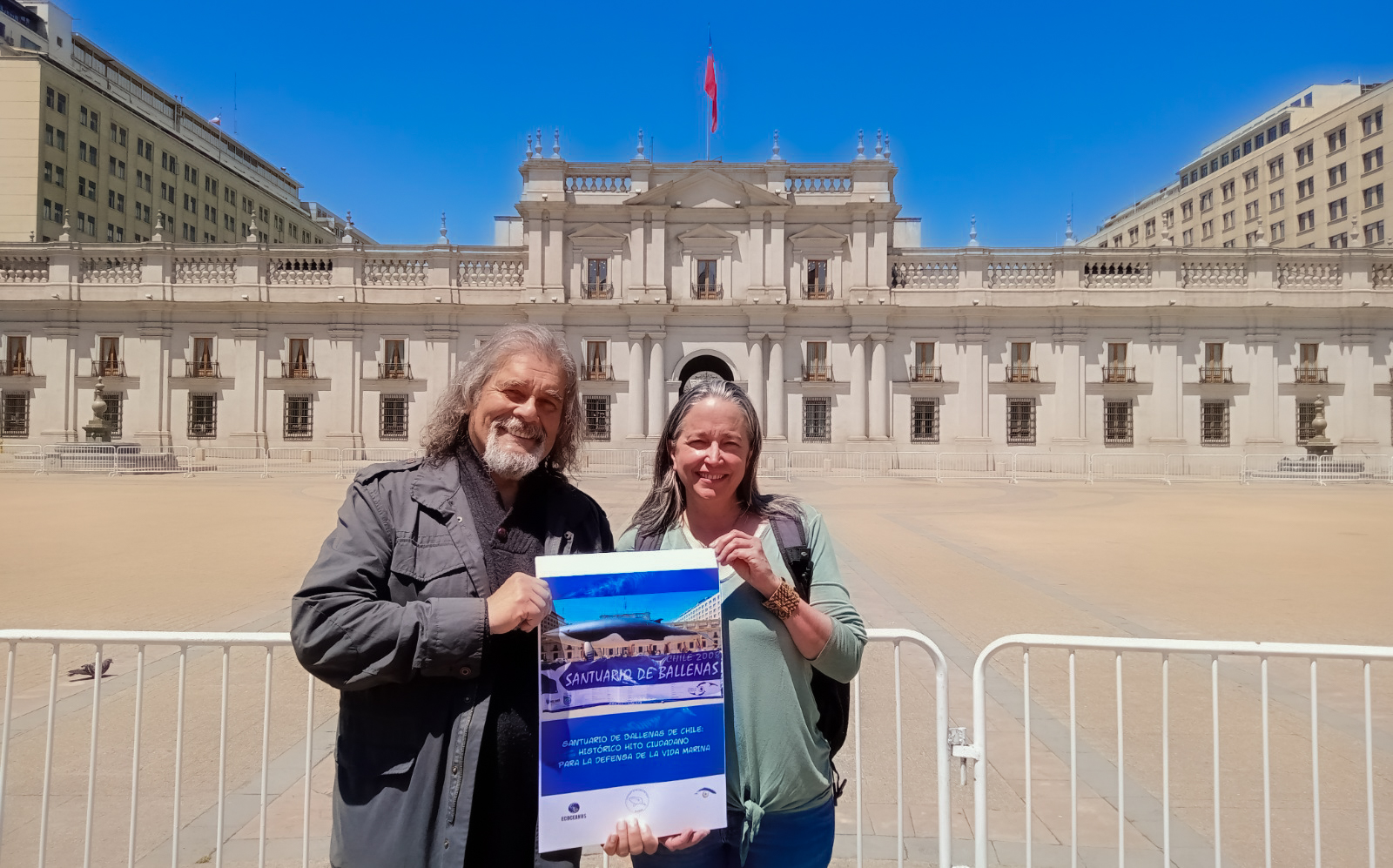Over seventy national, regional, and international organizations have come together to urge President Gabriel Boric to enhance the implementation of measures to protect cetaceans and prevent the extinction of the Southern Right Whales in Chile’s southeastern Pacific waters, fifteen years after the establishment of the country’s whale sanctuary.
Representatives from the Cetacean Conservation Center and Ecoceanos Center delivered a letter on behalf of these organizations at the Palacio de la Moneda, expressing concern over the increasing number of southern right whale deaths recorded in Chilean waters in recent years, including the distressing loss of a calf. These organizations call for urgent action to address the two main threats to the species: intensive fishing practices and salmon farming operations.
The population of southern right whales in the southeastern Pacific is critically endangered, with less than 50 mature individuals remaining. Therefore, any human-induced deaths could lead to the extinction of this species in Chile and Peru.
The letter highlights the key factors currently affecting critical feeding, mating, breeding, and migratory routes for these whales. These factors include entanglement in fishing gear and anti-predator nets used by salmon farms, collisions with vessels, habitat degradation caused by chemical, organic, and plastic pollution, and the impacts of the climate crisis. “All these factors pose a significant threat to the Southern Right Whale population in the Chilean-Peruvian region”, stresses the message.
The NGOs also emphasize that genetic studies have shown that this particular population is unique and distinct from other Southern Right Whale populations in the Southwest Atlantic and Indo-Pacific. Their isolation makes their recovery even more vulnerable, as there is no possibility of repopulation from other areas.
To address these concerns, the organizations urge President Gabriel Boric to “pay immediate attention to the situation and take comprehensive and preemptive efforts to ensure the long-term survival of these whales in Chilean waters.” They remind him that “the existing legislation establishing Chile’s whale sanctuary includes a regulatory framework to protect critical areas for the whales’ life cycles, such as breeding sites, mating areas, parental care zones, feeding grounds, and migration routes.”
The organizations call for stronger enforcement and implementation of the sanctuary’s regulations, including the regulation of maritime traffic and the reduction of vessel speeds in whale-watching areas. They also demand strict regulation of fishing practices and intensive industrial aquaculture to prevent entanglement and reduce chemical contamination. Furthermore, they recommend the cessation of operations of intensive marine farming centers and the maritime and logistical support activities of salmon farming within protected coastal areas, national parks, marine protected areas, and marine reserves.
The letter also highlights that the existing regulatory framework already includes special measures for southern right whale observation, limiting sightings to coastal platforms to ensure maximum protection from anthropogenic activities and harassment by human observers.
Therefore, the organizations call on Boric to strengthen the enforcement of current whale-watching regulations, penalize boat-based observations and harassment of southern right whales, and establish mobile and temporary protected areas around the animals to halt human activities while the whales are near the coast, especially for mothers with calves.
Elsa Cabrera, executive director of the Center for Cetacean Conservation and coordinator of the Chile 2008, Whale Sanctuary campaign, stated that “this is a resounding call from millions of people, represented by over seventy civil organizations from all corners of the globe, stressing the urgent need for full compliance with the protective measures outlined in Chilean law for the conservation of cetaceans. We expect a strong and supportive response from President Boric, as the survival of the southern right whale in the southeastern Pacific and the effective conservation of all other cetacean species in Chilean waters rest upon it.”
Juan Carlos Cárdenas, executive director of Ecoceanos Center and also coordinator of the campaign for the creation of Chile’s whale sanctuary, highlighted that “the government of President Boric holds the responsibility before the international community to implement the recommendations of the Scientific Committee of the International Whaling Commission. This includes taking measures to control the lethal interactions between southern right whales and the expansion operations of the salmon exporting industry. Failure to act could result in this critically endangered species becoming the first to go extinct in the Southeast Pacific during the first half of the 21st century.”



